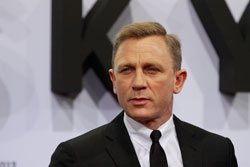News of the Week: Christmas Wars, Computer Concerns, and the Case of the Confusing Yam

Starbucks and the War on Christmas
Ah, the Christmas season. That time of year when bells jingle, choirs sing, snow falls, and people argue about paper cups.
It seems that the War on Christmas comes earlier and earlier every year. This year’s battle centers on Starbucks. This year the coffee shop chain decided to go with a plain red cup with their green and white logo, instead of something featuring Santa or reindeer or snowflakes, and some people are rather upset by that decision.
Here’s the thing: As E! Online illustrates, the company’s cups are always rather minimalist, and if they do have something on them it’s usually a drawing of snowflakes or a reindeer or ornaments and trees. And is there even any religious aspect to snowflakes and reindeer and candy canes we’re missing by having a bare cup this year?
To be clear, Starbucks says there is no directive for employees not to say merry Christmas to their customers, and they do sell coffee labeled Christmas Blend, a Merry Christmas gift card, an Advent calendar, and many other festive things. While I do think that there have been examples of companies and towns being overly politically correct during the Christmas season in the past, this isn’t one of those times. As even The National Review says, viewing plain coffee cups as an attack on religion is embarrassing.
Of course, presidential contender Donald Trump has weighed in on the controversy. While Trump said, “Seriously, I don’t care,” he also hinted he might end the Starbucks lease at Trump Tower, adding “maybe we should boycott Starbucks. … If I become president, we’re all going to be saying merry Christmas again — that I can tell you.”
And millions of people around the country are waiting to see just how he’s going to enforce that.

The End of the Personal Computer?
In an interview with The Telegraph Apple CEO Tim Cook asks the question, “I think if you’re looking at a PC, why would you buy a PC anymore? No really, why would you buy one?” And to answer that I would say, “Because I like them, that’s why!”
If he wanted me to expand on my answer, I’d say it’s because a laptop (or desktop) is the natural tech to use for producing content like writing. I haven’t used tablets or smartphones that much, but I can’t imagine working on them for an extended period of time. Movies? Games? Surfing the Web? Sure. But for real work I’ll go the traditional route (and there’s no way I’m going to start doing everything on a watch).
It’s a little disconcerting to hear the CEO of the company that makes the MacBook laptops say that the personal computer is going away because a MacBook is what I’m typing on right now. But I’m going to predict that we’re still going to have desktops and laptops for many years to come, so don’t worry about it.

Ranking the Bonds
Whenever a new James Bond movie opens, people love to rank all the movies and the people who have played 007. With SPECTRE in theaters now — and don’t listen to the critics, it’s a good flick — I thought I’d rank the Bonds.
The way it usually works is that you like the Bond you grew up with. I didn’t see any of the Sean Connery movies in the theaters — I saw all the Roger Moore ones there though — but I watched Connery’s Bond countless times on TV and he will always be number one to me.
- Sean Connery
- Daniel Craig
- Timothy Dalton
- Pierce Brosnan
- George Lazenby
- Roger Moore
- Barry Nelson (played Bond in a 1954 episode of the anthology series Climax!)
- Everyone who played Bond in the awful 1967 version of Casino Royale
Who’s your favorite Bond?
The Blackout of 1965
Where were you when the lights went out in the Northeast in 1965? I was around 5 months old so I was probably in my mother’s arms or, knowing me, crying because the TV just went out. The blackout, caused by human error, affected many states, including New York, Massachusetts, Connecticut, New Hampshire, Vermont, New Jersey, Pennsylvania, and even Ontario, Canada. While not everyone in those places lost power, the outage did hit 30 million people, and they didn’t have power anywhere from just a few hours to over 13 hours. Imagine this happening today, and people couldn’t post on Facebook for 13 hours. Oh the humanity!
This week marked the 50th anniversary of the event. Here’s NBC’s breaking news coverage:
The Return of MST3K
In the not-too-distant future, probably 2016 AD, we’re going to see the return of the original Mystery Science Theater 3000. After 15 years and the straightening out of some legal issues, creator and original host of the make-fun-of-movies show Joel Hodgson is bringing it back.
- This time there will be a different host and some new cast members, along with some of the original cast and writers we loved way back when. Hopefully that will include former cast members Michael J. Nelson, Kevin Murphy, and Bill Corbett, who are currently doing the fantastic RiffTrax.
They’ve set up a Kickstarter and it has already reached $1 million, and there’s still almost a month to go in the campaign. The gang hopes to reach at least $2 million, so they can do three episodes on DVD/online. If they reach $3.3 million, they’ll do 6. $4.4 million will get us 9 episodes, and $5.5 million will mean a full 12-episode season.
Fa la la!
![IBM WatsonBy Clockready (Own work) [CC BY-SA 3.0 (http://creativecommons.org/licenses/by-sa/3.0) or GFDL (http://www.gnu.org/copyleft/fdl.html)], via Wikimedia Commons](https://www.saturdayeveningpost.com/wp-content/uploads/satevepost/20151113-ibm-watson.jpg)
By Clockready (Own work) [CC BY-SA 3.0 (http://creativecommons.org/licenses/by-sa/3.0) or GFDL (http://www.gnu.org/copyleft/fdl.html)], via Wikimedia Commons
Watson, The IBM Chef
Sure, IBM’s Watson computer can beat Jeopardy! champions Ken Jennings and Brad Rutter, but can it make beef stroganoff?
I don’t really know. I would love to explore the IBM Chef Watson site more thoroughly, but you have to register with either a Facebook or IBM account. I have neither so what I can see on the site is rather limited. Apparently you can use the site — a joint effort between IBM and Bon Appetit — to create recipes and share them with your friends.
The recipes I’ve seen on the site include a Tomato Tart, Party Bourbon Punch, Salmon Tacos, and a Russian Celery Parsley Bread Lemon Juice Sandwich (yes), created by engineer and chef Florian Pinel for his TED Talk about food waste.

Sweet Potatoes Are Yams
I wonder if Watson knows the difference between sweet potatoes and yams? It will soon be Thanksgiving so I thought I’d investigate.
According to The Kitchn, there really isn’t any difference. The yams we eat here in North America are sweet potatoes, even if they’re labeled “yams.” A real yam is native to Africa and Asia and you’re probably not going to find one, unless you go to a specialty supermarket. And to confuse things more, there are two types of sweet potatoes, firm and soft. The yams you find at the supermarket are the soft, sweet potatoes and are labeled yams because they kinda look like real yams. Got that? Good. Maybe you can explain it to me.
I’ve been eating canned yams, the ones in sweet syrup, for many years, while at the same time refusing to eat the sweet potatoes at the Thanksgiving table. I guess it’s time to revisit sweet potatoes, as long as they’re covered in enough stuff like cinnamon and marshmallows to mask the taste. When you reach a certain age, it’s hard to change your eating habits. I yam what I yam.
Upcoming Events and Anniversaries
Suez Canal opens (November 17, 1869)
The 101-mile waterway connects the Mediterranean Sea to the Red Sea.
President Nixon’s “I am not a crook” press conference (November 17, 1973)
Nixon made the comments while meeting with 400 Associated Press editors in Orlando, Florida.
The “Heidi Game” (November 18, 1968)
The New York Jets vs. Oakland Raiders game had a really exciting ending. Too bad NBC interrupted it with a showing of the movie Heidi.
President Lincoln delivers Gettysburg Address (November 19, 1863)
Here’s the full transcript of Lincoln’s speech in Gettysburg, Pennsylvania.
Nuremberg trials begin (November 20, 1945)
The post-World War II military tribunals prosecuted military and political leaders of Nazi Germany.